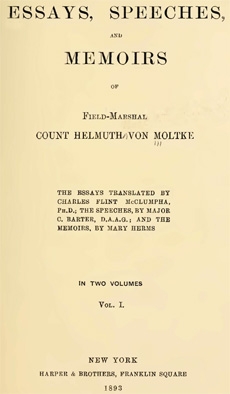|
PREFACE
THE five shorter essays that follow were published between the years 1841 and 1844 in the Augsburger Allgemeinen Zeitung. These are: "Germany and Palestine," 1841; The Country and People of the Kurds," 1841; "The Military and Political Situation of the Ottoman Empire," 1841; "Reshid, Izzet, and the Porte," 1842; "The Mouth of the Danube," 1844.
These essays, according to their contents, may be grouped together under the title" Essays upon the Eastern Question" and although the second discusses it from an ethnographical standpoint, and the fifth from a geographical one, yet all five treat primarily of the political and military events in the East, that have often greatly agitated Europe in the past and continue to do so at present.
Late in the autumn of 1839, :Moltke returned from Turkey where, during his four years' residence, he had acquired a thorough knowledge of the country and the people, and had collected various and valuable stores of information. He could thus be well regarded as one of the most authoritative, most efficient critics of the East.
After his return from the battlefield of Nisib, there was a momentary pause in the long years of contentions between the Sublime Porte and its rebellious vassal, Mehemed Ali of Egypt, when it seemed as if the decaying power of the Turks would be completely crushed. The Sultan, Mahmoud III, who had begun to reform his empire with an iron hand, but with little success, had died a short time before the terrible news of Nisib had reached Stamboul. His successor was Abdul Mejid, a weak lad of sixteen. He found his empire without army or navy, for the traitorous Kapudan Pascha had taken the latter to Alexandria to Mehemed Ali; he found all Syria in the hands of the Egyptians, to whom the way to the Bosphorus was open. But Mehemed Ali was not able to reap the benefits of the success he had won, and when Reschid Pasha, who had an European education and favoured progress, entered the ministry at Constantinople, those European powers that were inclined to support the integrity and temporal development of Turkey, began to lay hold upon stronger measures. The Hattischerif of Gulhane, which was executed by Reschid (2nd November, 1839), was most influential in producing a favourable impression on the powers. This decree of the Sultan insured to all his subjects, both the Faithful and the Rajah, security for their lives, honour and property, equal taxation, and a systematic collection of the taxes; he thus meant to take a far more important step on the road of reform. The ministry of Thiers in France alone still continued to support the bold demands of Mehemed Ali, so that the rest of the great European powers formed a quadruple alliance for the protection of the Porte (July 15th, 1840), and made military advancements against the rebellious vice-regent, who had relied upon the aid of France which had not been actually given. An Anglo-Austrian fleet and a Turkish land-force attacked the Egyptians in Syria, and after Beyrout, Akka, and other coast towns had fallen, and the inhabitants of Syria had taken up arms for the Sultan, Ibrahim Pasha, the son and general of Mehemed Ali, vacated the country and led his army back to Egypt in a manner that soon resembled flight. In the meantime an English squadron appeared before Alexandria, and Mehemed Ali was again forced to beg for peace, which was granted him upon acknowledgment of. the inheritance of his dynasty (in the beginning of 18+1).
But soon after these events Reschid Pasha left the ministry, and a short time after Izzet Mehemed Pasha was appointed his successor. Izzet was one of the most influential leaders of the old Turkish conservative party, and his entrance into office was the signal for a complete rupture in the endeavours for reform. But there were so many influences brought to bear upon the weak young Sultan that Izzet also remained a short time in the ministry, and the government at Constantinople continued to be agitated for a long time by opposing factions, nor was it able to become master of the internal difficulties during the time in which the following articles were written. Rebellions in Crete, complications in the government of the Lebanon, a serious quarrel with Persia, disturbances in the Danube principalities, all combined to make the condition of the Ottoman Empire insecure for years, and a menace to the peace of the world.
It seemed necessary to preface the following essays with this cursory historical review, for the purpose of informing the reader of to-day.
Essays upon the Eastern question
Germany and Palestine
A little company of Europeans has brought the Syrian question, which was long unsettled, to a speedy issue by means of a forcible and successful mode of action. Acre fell under the thunders of an Anglo-Austrian fleet, and the phantom of an Egyptian-Arabian power vanished of itself. Lovely Syria was conquered a second time for the Padishah, the bold vassal who had so long defied his authority till he was humbled in the dust--but is the Eastern conflict now settled by this means? Hardly anyone will answer this in the affirmative if he has travelled through the Turkish provinces and is able and willing to recognize the truth.
The complete extinction of military spirit among these races that were once so warlike is manifested on every new occasion. If it 'was in the interest of the English to lay stress upon the strength and boldness of the action of the Turkish army against Ibrahim, the peaceful and impartial witnesses and associates, on the other hand, declare that they saw just as little display of brilliant fighting as a year before at Nisib. The Europeans have done everything. From the moment ...
|
